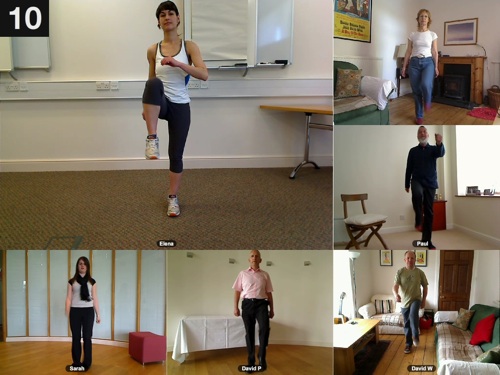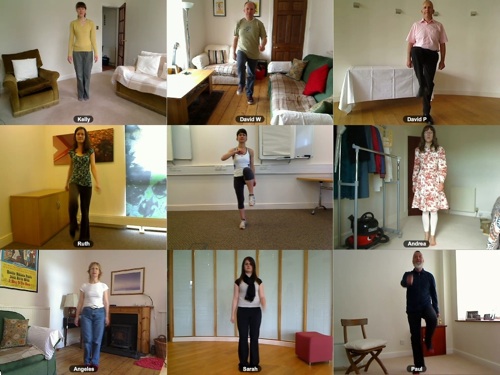|
Remote Rehabilitation
a novel communication system to deliver group-based pulmonary rehabilitation in the home via the internet
Andrea Taylor, Angus Aitken, Stefan Agamanolis (Distance Lab); David Godden (Centre for Rural Health); Judith Colligan (Raigmore Hospital)
Pulmonary rehabilitation is effective in treating COPD and other diseases. Rehabilitation, combining physical exercise with education, is usually undertaken in hospital or clinic-based groups led by a therapist. The support of the group is important. However, travel demands can mean that patients, e.g. in remote and rural areas, are unable to take part. This project investigates the use of internet communication technology to allow people to engage in a pulmonary rehabilitation group from home, linking up with other patients and their therapist.

Chronic Obstructive Pulmonary Disease (COPD) - which includes lung diseases like chronic bronchitis and emphysema - is one of the most common respiratory diseases in the UK, affecting at least 900,000 people. Rehabilitation groups led by therapists can improve symptoms and quality of life for patients, but may not be accessible to people living in more remote places. For example, in the Highlands of Scotland there are over 4,500 people with COPD, of whom almost half live in the most peripheral general practice areas, remote from specialist clinic facilities. Travel demands means that many patients are unable to attend exercise groups.
The Remote Rehabilitation project aims to develop new communication system that will enable sufferers of chronic lung disease (and potentially other conditions) to participate in group rehabilitation exercises in the comfort of their own homes in such a way as to maintain the effect of group awareness and support. This novel communication system, based on internet video-conferencing technologies, will be piloted in the Highlands of Scotland over the course of the project. Patients using the system will be able to see and talk to each other as well as a physiotherapist who will lead each session.
Evidence shows that being in a group setting and performing the exercises together with other patients gives sufferers much needed support and improves their outcome. A key aspect of the project is investigating how to use Internet-based communication to maintain this group effect while patients participate in exercises in their own homes.
The project is also exploring ways to enhance the patient's experience through interactive design, visualisation and physiological monitoring.
Remote Rehabilitation is a collaboration between Distance Lab and the Centre for Rural Health and has been funded by a £63,000 grant from Chest, Heart & Stroke Scotland (CHSS), a Scottish-based charity that provides care and support for people and families affected by lung disease, and funds research into prevention, diagnosis, treatment, rehabilitation and the social impact of chest, heart and stroke illness.
The Remote Rehabilitation project addresses an important therapy for people with a debilitating lung disease. It examines the use of communication technology that will widen the availability of services and improve the quality of life for people regardless of their location or their ability to travel to hospitals for treatment.

| 

